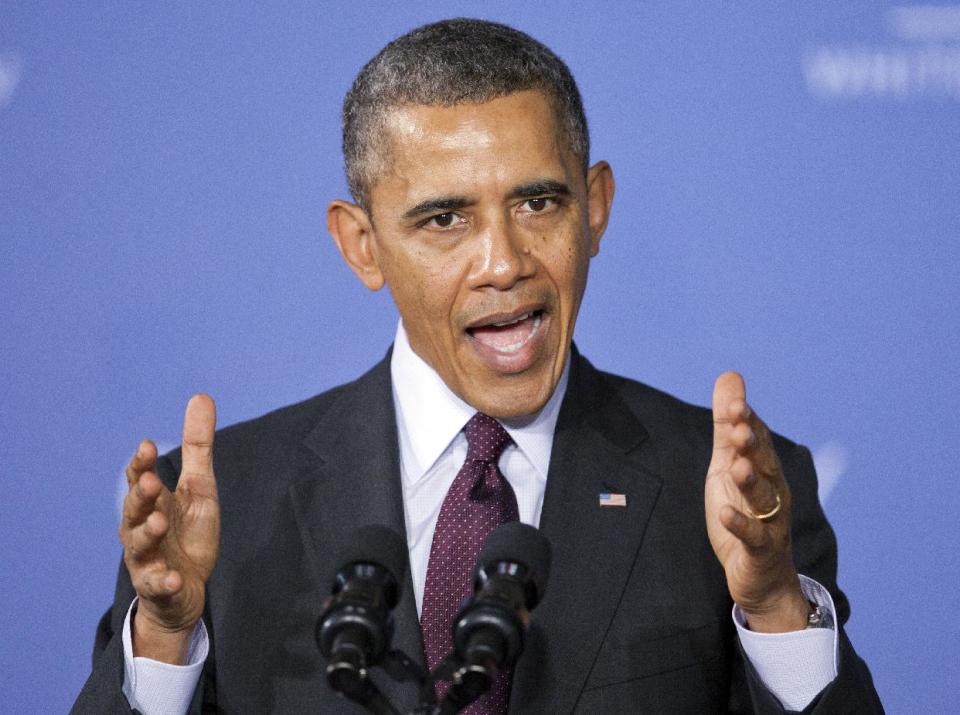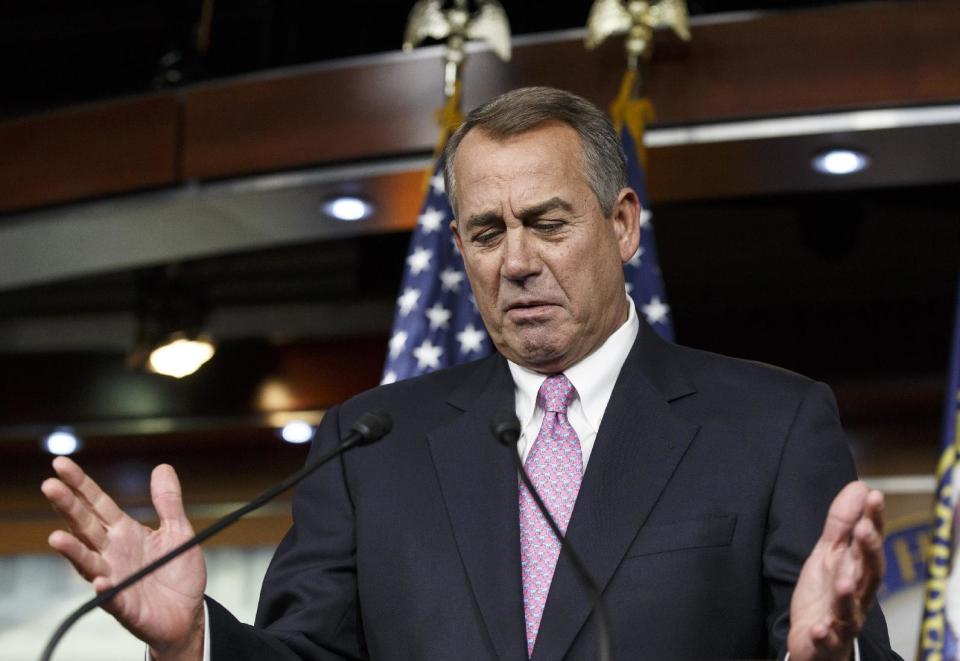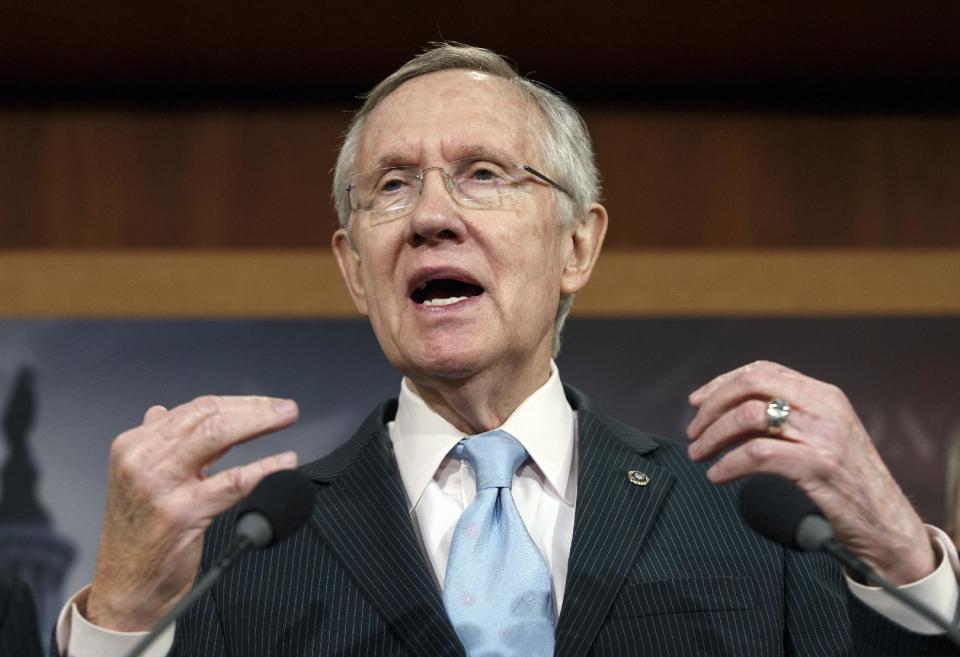Analysis: Washington gridlock at a crossroads
WASHINGTON (AP) — President Barack Obama and Congress stand at a junction.
The road the country has been on for the past five years is now beginning to come to an end. The Federal Reserve, which pumped $3 trillion into the economy to keep the Great Recession from worsening, is withdrawing its financial lifeline amid signs of fresh economic growth. The nation's gross domestic product is inching up, and annual federal budget deficits are heading down.
How Washington policymakers respond to the improvements in the economy may even sow the seeds for more cooperation in Washington.
But don't count on it.
Finger-pointing still abounds between the Democrats who control the White House and the Senate and the Republicans who control the House of Representatives ahead of midterm elections later this year that will determine control of Congress for the remainder of Obama's presidency.
"The president's policies are not working," House Speaker John Boehner, R-Ohio, declared.
Senate Majority Leader Harry Reid, D-Nev., countered: "We cannot have a country that's paralyzed because of a group of people — the group of people who are the tea party-driven Republicans in Congress."
"There are no winners here," suggested Obama, with just under three years to go to complete his economic legacy. "The American people are completely fed up with Washington."
An important indicator of the state of the economy came Friday, when the Labor Department reported that the U.S. jobless rate in January fell to a five-year low of 6.6 percent. But employers added just 113,000 jobs, a modest gain. The numbers were a slight improvement from the 6.7 percent rate of the month before and a lot lower than the 10 percent reached briefly in 2009. But that is still significantly higher than the 5 percent or lower unemployment rate that usually signifies a healthy economy.
But even as public confidence in the economy is improving, polls also show that Americans' approval of Congress is at or near record lows.
More key fiscal battles are looming after self-inflicted wounds like last fall's government shutdown and repeated debt-limit crises over the past few years.
The federal government once again is about to bump into the limit on its borrowing authority, which is set by law. Last October's deal to end the 16-day partial government shutdown suspended the debt ceiling until Feb. 7. That's Friday.
Treasury Secretary Jacob Lew has urged Congress to act quickly to raise the debt limit, saying "at some point very soon," probably by month's end, he'll run out of delaying strategies, and the nation could default for the first time ever on some of its debt.
"This can and should be a breakthrough year for our economy," Lew told the Bipartisan Policy Center. "The table is now set for us to build on the economic progress that we have made over the last five years — and it is incumbent on Washington to be part of the solution, and to avoid the brinksmanship of recent years that has done so much to diminish economic momentum."
Some congressional Republicans are looking for concessions from the administration in exchange for their support on the debt limit increase.
Also, early next month, Obama will submit his federal budget for the fiscal year that begins Oct. 1. Presidential budgets almost always trigger partisan warfare. In fact, the White House is already drawing heat from some Republicans for delaying its fiscal 2015 budget submission by a month. Presidential budgets are traditionally sent to Congress in early February.
"The president failed to meet one of his most basic responsibilities — submit a budget to Congress," complained Sen. John Cornyn, R-Texas, noting that Obama had called on Congress only two weeks ago in his State of the Union address to act quickly on his priorities. Cornyn is the sponsor of a bill that would withhold Lew's government salary for every day the president's budget is late.
Republicans constantly blame Obama and Democrats on Capitol Hill for a range of problems, beginning with the president's rocky rollout of his health care overhaul and expensive government programs, claiming such policies are threatening to derail the recovery that began in 2009. Democrats, in turn, point at Republicans and accuse them of triggering the government shutdown and advocating hurtful spending cuts on social programs.
Both parties are mindful of the enormous public anger that the shutdown ignited and its damage to the economy. Many don't seem quite as eager to go to the mat again, especially on the fast-approaching debt ceiling.
"The goal here is to increase the debt ceiling," Boehner told reporters. "No one wants to default on our debt." However, the House speaker didn't rule out trying to get something in return for such GOP support.
"Republicans got burned by the government shutdown and decided to take that off the table," said Thomas Mann, a scholar who studies Congress at the Brookings Institution. Mann thinks the GOP will also back away this time from digging in its heels on the debt ceiling and try to reach some sort of deal on immigration. "But those battles are far from resolved."
Standard & Poor's called the October shutdown, which furloughed 800,000 federal workers, a $24 billion drag on the U.S. economy. The bipartisan Congressional Budget Office estimates the shutdown, together with a cutback in government spending and higher taxes that took effect last year, subtracted 1.5 percentage points from last year's economic growth, extending the nation's long crawl out of the deep 2007-2009 recession.
For all of 2013, the economy expanded at a lackluster 1.9 percent pace, even though the October-December quarter posted a respectable 3.2 percent increase in the gross domestic product.
"The single biggest impediment to a stronger economic recovery has been the years of dysfunction in Washington and the policies that have emerged," suggests Steven Rattner, a longtime Wall Street executive who was Obama's auto-bailout adviser in his first term.
___
EDITOR'S NOTE — Tom Raum covers politics and economics for The Associated Press.
___
Follow Tom Raum on Twitter: http://www.twitter.com/tomraum
An AP News Analysis




